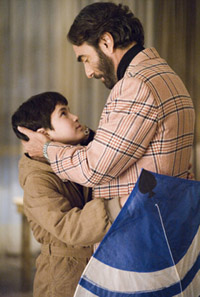Father of "The Kite Runner" actor says movie release delayed

The company producing "The Kite Runner" movie has delayed the release until both of the main actors leave their native Afghanistan , father of a 12-year-old boy starring in the film said.
The New York Times reported Thursday that the studio distributing the movie, Paramount Vantage, was postponing the movie's release to give three of its child actors the chance to leave Kabul, out of concern they could be attacked over a culturally inflammatory rape scene.
"The Kite Runner," based on the 2003 best-selling novel by Afghan-American writer Khaled Hosseini, tells the story of two boys and the transformation of their relationship through that act of violence. The story's main character, Amir, witnesses the rape of his friend, Hassan, but does nothing to stop it.
"The Kite Runner" was originally scheduled for U.S. release in late November, and a new release date has yet to be announced.
Paramount Vantage has "promised us that they will solve whatever problem that we have now or we might have in the future," said Ahmad Jaan Mahmidzada, whose 12-year-old son Ahmad Khan Mahmidzada plays Hassan.
"They also said that they have delayed the release of the film until they take me and my son out the country," Mahmidzada told The Associated Press.
He added that the film company would gauge the reaction of people after its eventual release and then decide how to help the family afterward.
Ahmad Khan was paid US$10,000 (EUR7,088) to portray Hassan. But the boy told The AP last month that he was not given an advance copy of the script and that he would never have taken the role had he known Hassan was raped. His family said they found out about the scene only days before it was shot.
Mahmidzada worries the story will stir ethnic tensions because it plays on stereotypes of Afghan ethnic groups, pitting a Pashtun bully against a lower-class ethnic Hazara boy.
Pashtuns, Afghanistan's largest ethnic group, and the Hazara minority were among several ethnic-based factions that fought bitterly during the Afghan civil war in the 1990s. Thousands of Hazaras were slain as the predominantly Pashtun Taliban seized power in the mid-1990s.
Ethnic violence has subsided since the fall of the Taliban in 2001, but Afghans fear any trigger that could revive tensions. Many were angered by the 2006 Indian film "Kabul Express" that portrayed Hazara militants as brutal and thuggish.
"It is good that they want to take the child out of the country but I don't think that will solve the problem," said Hangama Anwari, the child-rights commissioner for the Afghanistan Independent Human Rights Commission.
People in Afghanistan, which has one of the highest illiteracy rates in the world, may think the rape scene actually happened, Anwari said, fearing it could spark protests.
The film's producers, Bennett Walsh and Rebecca Yeldham, said last month, they "have the utmost concern for the welfare" of the boys who were in the film.
"When we visited with all the actors and their families in Kabul earlier this year, the families addressed their concerns directly with us and said they were fine with the content of the scene, as long as we portrayed it in a sensitive manner," Walsh and Yeldham told The AP. "We made this a priority and followed their specific instructions."
Mahmidzada said company representatives told them someone would be coming to Kabul in the next two or three days to work out arrangements for their departure.
"I am happy that at least they realized our problem here and made a decision about my son," he said. "I still do not know what will happen next, but at least I am less concerned about this issue then I was in the past."
Subscribe to Pravda.Ru Telegram channel, Facebook, RSS!


